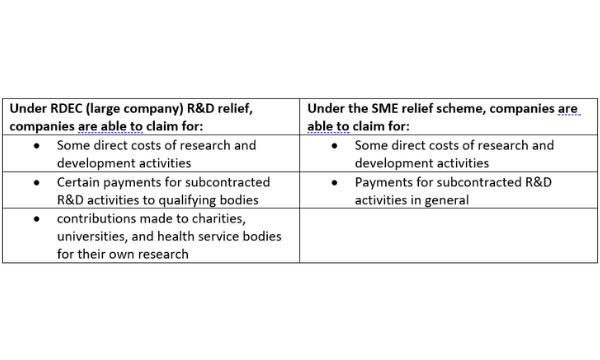
During the 2021 Autumn budget, the government confirmed their intent to refocus R&D tax credit relief towards innovation in the UK. This has resulted in proposed changes to reform the way in which companies claim costs for subcontracted research and development activity.
What are the current rules surrounding R&D tax credit subcontractor costs?
Under current R&D tax credit legislation, companies are able to claim relief on R&D activity that is conducted both in the UK and overseas.
What are the proposed changes surrounding R&D tax credit subcontractor costs?
In order to achieve their goal of increasing UK innovation, the Government intends to make the following changes to R&D tax credit relief:
Restricting the claimable options for subcontracted R&D
Where companies subcontract research and development tasks to a third party, in future they will only be able to claim relief for expenditure where the third party performs the work within the UK. All other rules for claiming subcontractor costs will remain the same. This will apply to the SME scheme, and a similar principle will apply in RDEC.
Restricting the claimable options for Externally Provider Worker payments
Under both schemes, where companies incur expenditure on payments for externally provided workers (EPWs), they will only be able to claim relief on such expenditure where those workers are paid through a UK payroll.
Exemptions
If a company subcontracts work to an overseas third party, it would not be able to claim R&D tax reliefs on that expenditure, but it would still be able to deduct those costs from taxable profits in the normal way. In addition, companies will still be able to claim R&D tax reliefs on:
- the costs of software and consumables sourced overseas
- payments for clinical trials volunteers overseas
- payments for data and cloud sourced overseas
These activities will be treated differently to subcontracted activity as they are considered inputs to activity in the UK.
Matthew Jones, managing director, LimestoneGrey commented:
It is no surprise that the Government has called for change in the way overseas subcontracted R&D is handled in terms of R&D tax credit relief. The Chancellor has repeatedly expressed his concern that the UK is well behind in trying to become globally competitive in science and innovation and these proposed changes aim to retain the knowledge created from research and development projects in the UK.
However, many companies take advantage of overseas labour, whether that is through subcontracted activities or payments to EPWs. This could be for several reasons, examples of which could be lower costs, access to specific expertise or a continuation of a long-standing relationship for on-going projects.
Companies that spend a proportion of their qualifying costs on overseas subcontracted activity will need to review their future R&D plans and take advice from a qualified R&D tax credit expert to ensure that they are making the best decisions for their business going forward.
What are the next steps?
While the government will refocus reliefs towards innovation in the UK as set out above, it is interested in views from stakeholders on how these principles could be reflected in legislation and whether there is a case for any narrow exceptions to allow claims on some overseas activity.
Draft legislation will be published later in the summer, with final legislation included in the Finance Bill 2022-2023. Changes will take effect from April 2023.

